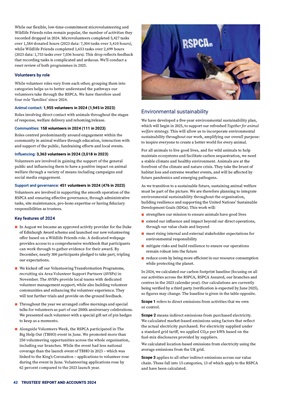
TRUSTEES' REPORT AND ACCOUNTS 2024
42
While our flexible, low-time-commitment microvolunteering and
Wildlife Friends roles remain popular, the number of activities they
recorded dropped in 2024. Microvolunteers completed 5,427 tasks
over 1,584 donated hours (2023 data: 7,304 tasks over 3,410 hours),
while Wildlife Friends completed 1,653 tasks over 2,699 hours
(2023 data: 1,753 tasks over 7,036 hours). This drop reflects feedback
that recording tasks is complicated and arduous. We'll conduct a
reset review of both programmes in 2025.
Volunteers by role
While volunteer roles vary from each other, grouping them into
categories helps us to better understand the pathways our
volunteers take through the RSPCA. We have therefore used
four role 'families' since 2024.
Animal contact: 1,955 volunteers in 2024 (1,945 in 2023)
Roles involving direct contact with animals throughout the stages
of response, welfare delivery and rehoming/release.
Communities: 158 volunteers in 2024 (111 in 2023)
Roles centred predominantly around engagement within the
community in animal welfare through education, interaction with
and support of the public, fundraising efforts and local events.
Influencing: 3,363 volunteers in 2024 (3,018 in 2023)
Volunteers are involved in gaining the support of the general
public and influencing them to have a positive impact on animal
welfare through a variety of means including campaigns and
social media engagement.
Support and governance: 451 volunteers in 2024 (476 in 2023)
Volunteers are involved in supporting the smooth operation of the
RSPCA and ensuring effective governance, through administrative
tasks, site maintenance, pro-bono expertise or having fiduciary
responsibilities as trustees.
Key features of 2024
• In August we became an approved activity provider for the Duke
of Edinburgh Award scheme and launched our new volunteering
offer based on a Wildlife Friends role. A dedicated webpage
provides access to a comprehensive workbook that participants
can work through to gather evidence for their award. By
December, nearly 300 participants pledged to take part, tripling
our expectations.
• We kicked off our Volunteering Transformation Programme,
recruiting six Area Volunteer Support Partners (AVSPs) in
November. The AVSPs provide local teams with dedicated
volunteer management support, while also building volunteer
communities and enhancing the volunteer experience. They
will test further trials and provide on-the-ground feedback.
• Throughout the year we arranged coffee mornings and special
talks for volunteers as part of our 200th anniversary celebrations.
We presented each volunteer with a special gift set of pin badges
to keep as a memento.
• Alongside Volunteers Week, the RSPCA participated in The
Big Help Out (TBHO) event in June. We promoted more than
250 volunteering opportunities across the whole organisation,
including our branches. While the event had less national
coverage than the launch event of TBHO in 2023 - which was
linked to the King's Coronation - applications to volunteer rose
during the event in June. Volunteering applications rose by
62 percent compared to the 2023 launch year.
Environmental sustainability
We have developed a five-year environmental sustainability plan,
which will begin in 2025, to support our refreshed Together for animal
welfare strategy. This will allow us to incorporate environmental
sustainability throughout our work, amplifying our overall purpose:
to inspire everyone to create a better world for every animal.
For all animals to live good lives, and for wild animals to help
maintain ecosystems and facilitate carbon sequestration, we need
a stable climate and healthy environment. Animals are at the
forefront of the climate and nature crisis. They take the brunt of
habitat loss and extreme weather events, and will be affected by
future pandemics and emerging pathogens.
As we transition to a sustainable future, sustaining animal welfare
must be part of the picture. We are therefore planning to integrate
environmental sustainability throughout the organisation,
building resilience and supporting the United Nations' Sustainable
Development Goals (SDGs). This work will:
• strengthen our mission to ensure animals have good lives
• extend our influence and impact beyond our direct operations,
through our value chain and beyond
• meet rising internal and external stakeholder expectations for
environmental responsibility
• mitigate risks and build resilience to ensure our operations
remain robust into the future
• reduce costs by being more efficient in our resource consumption
while protecting the planet.
In 2024, we calculated our carbon footprint baseline (focusing on all
our activities across the RSPCA, RSPCA Assured, our branches and
centres in the 2023 calendar year). Our calculations are currently
being verified by a third party (verification is expected by June 2025),
so figures may change. The baseline is given in the table opposite.
Scope 1 refers to direct emissions from activities that we own
or control.
Scope 2 means indirect emissions from purchased electricity.
We calculated market-based emissions using factors that reflect
the actual electricity purchased. For electricity supplied under
a standard grid tariff, we applied CO₂e per kWh based on the
fuel-mix disclosures provided by suppliers.
We calculated location-based emissions from electricity using the
average emissions from the UK grid.
Scope 3 applies to all other indirect emissions across our value
chain. These fall into 15 categories, 13 of which apply to the RSPCA
and have been calculated.